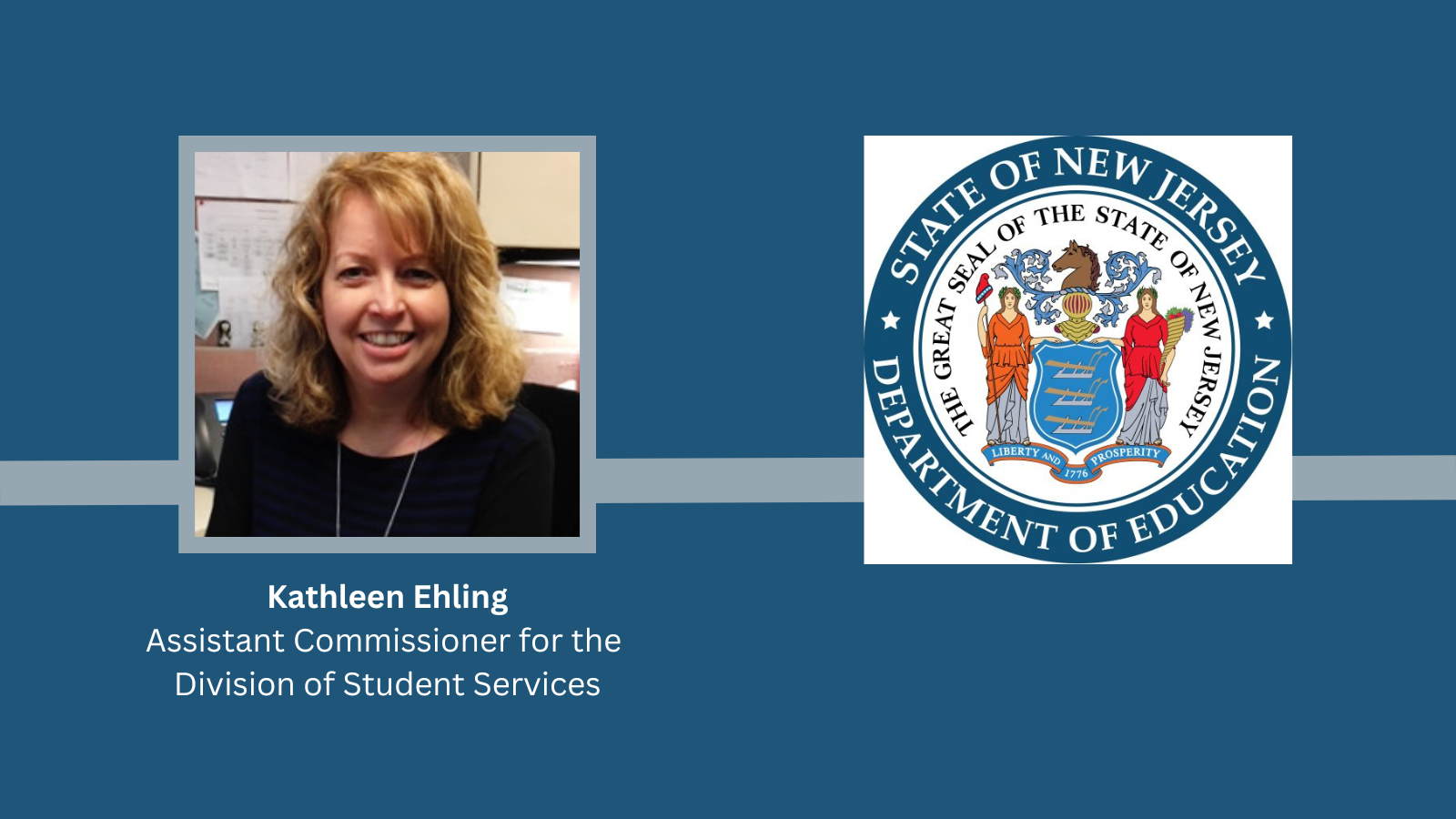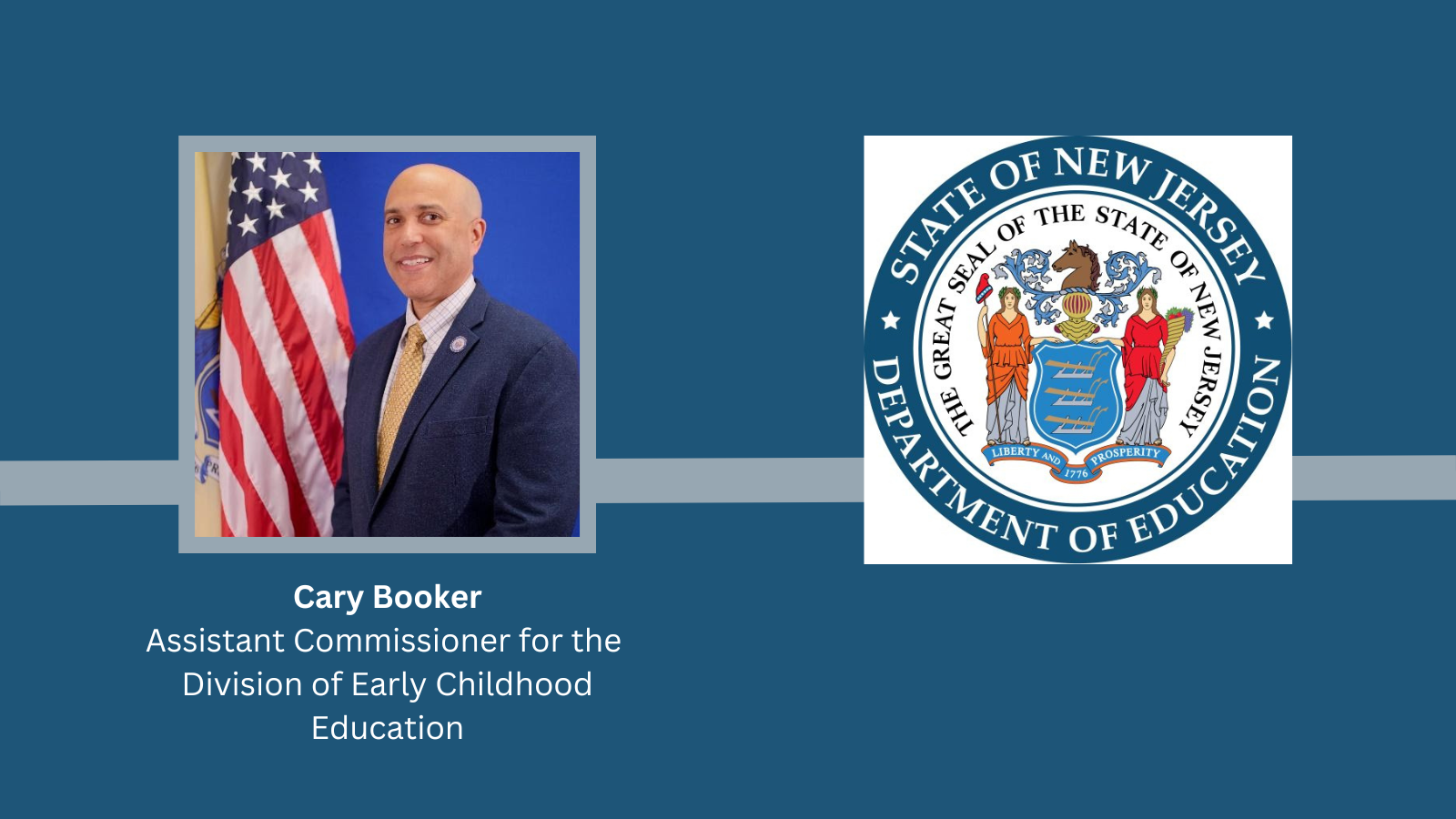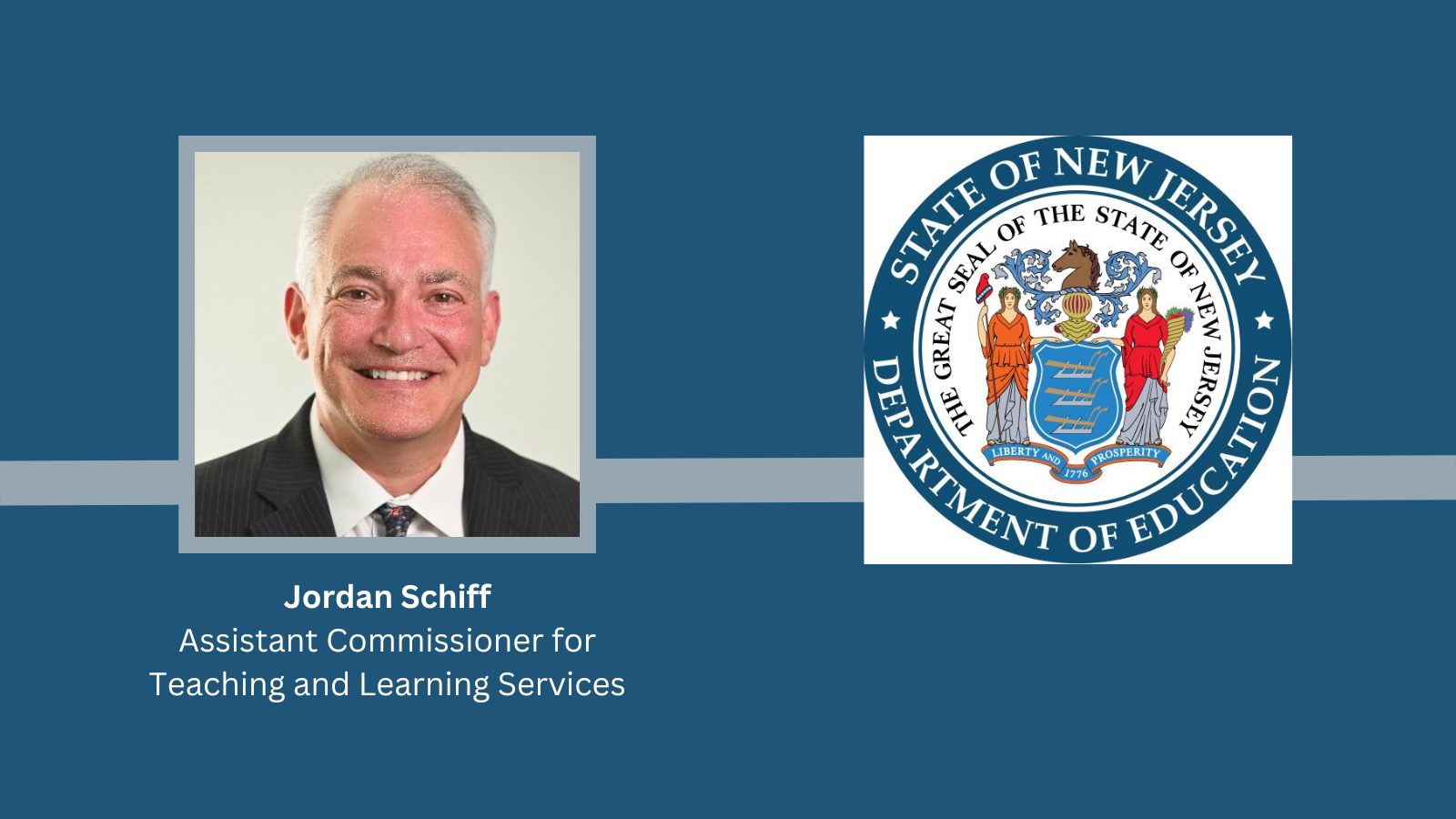SISEP Active State
Intensive Support

New Jersey Department of Education
Mission: The NJDOE supports schools, educators and districts to ensure all of New Jersey's 1.4 million students have equitable access to high quality education and achieve academic excellence.
Vision: Become a model organization that strengthens teaching, leading and learning in order to increase educational equity for all students.
The New Jersey Department of Education has partnered with SISEP for four years.


New Jersey - Team Structure
Executive Sponsors of SISEP Partnership:

Kathleen Ehling, Esq., has worked for the Department of Education for over 16 years. She is currently the Acting Assistant Commissioner for the Division of Student Services. In this role, Kathleen oversees the Offices of Special Education, Special Education Policy and Dispute Resolution, Supplemental Educational Programs, Fiscal and Data Services, Student Support Services, and the Marie H. Katzenbach School for the Deaf. In her previous role as the Director of the Office of Fiscal and Data Services, she oversaw the administration of federal and state grant funds for the Division of Student Services. Prior to this role, Kathleen served as the Manager of the Bureau of Governance and Fiscal Support, Office of Special Education Policy and Procedure within the New Jersey Department of Education. In this capacity, she oversaw the implementation of administrative policy for the office, including the development of regulations, model IEPs and the Parental Rights in Special Education booklet. In addition, Ms. Ehling also oversaw the dispute resolution system, the complaint investigation process, the approval and monitoring of approved private schools for students with disabilities and clinics and agencies, the SEMI program, and the IDEA Part B grant process. Additional duties included coordinating submission of the State Performance Plan/Annual Performance Report and the State Systemic Improvement Plan to the United States Department of Education. Prior to assuming the role of Manager, Ms. Ehling worked as a special assistant to the Director of the Office of Special Education Programs, a complaint investigator, and a mediator with the NJOSEP. Prior to joining the department, Ms. Ehling worked as a fifth-grade teacher in the West Windsor-Plainsboro School District.

Cary Booker is the Assistant Commissioner for the Division of Early Childhood Education at the New Jersey Department of Education. The division includes the Office of Preschool Education and the Office of K-3 Education. The Division also houses the federal Head Start program and the Governor’s Council for Young Children. In this position, Mr. Booker oversees the priorities of Governor Murphy and Acting Commissioner Angelica Allen-McMillan, Ed.,D. in supervising the birth through 3rd-grade education initiatives that include the expansion of New Jersey’s nationally recognized high quality preschool program.
Working collaboratively within the NJDOE and other state agencies, the Division of Early Childhood Education manages the social, emotional, physical, and academic development of New Jersey’s youngest learners. The division also provides leadership, resources, and professional development to support high-quality teaching and learning within New Jersey’s early childhood ecosystem.
Before joining the NJDOE, Mr. Booker served as a Senior Policy Advisor in the Governor’s office and, during his career, has served in other high-level positions at various institutions. He served as Associate Dean of Academic Affairs and director of The Academic Foundations Center/Educational Opportunity Fund Program at Rutgers University, Newark; Assistant Dean of Academic Affairs at LeMoyne-Owen College in Memphis, TN; and Vice President of Omni Schools also in Memphis, TN.
Mr. Booker completed his doctoral coursework in social psychology at The University of Texas and earned a Bachelor of Arts from Amherst College in Massachusetts.

Tonya Coston has worked for the Department of Education for over 23 years. She is the Executive Director for the Division of Early Childhood Services. In this role, she oversees the priorities of Governor Murphy and Acting Commissioner Angelica Allen-McMillan, Ed., D. in supervising the birth through 3rd-grade education initiatives that include the expansion of New Jersey's nationally recognized high-quality preschool program. The Division includes the Office of Preschool Education and the Office of K-3 Education. The Division also houses the federal Head Start Collaboration Office and the Governor's Council for Young Children.
Working collaboratively within the NJDOE and other state agencies, the Division of Early Childhood Services manages New Jersey's youngest learners' social, emotional, physical, and academic development. The Division provides leadership, resources, and professional development to support New Jersey's early childhood ecosystem's high-quality teaching and learning.

Jorden Schiff, Ed.D. was originally hired by the New Jersey Department of Education as the Assistant Commissioner for Field Support and Services and now leads the Division of Teaching and Learning Services. He joined the Department after serving as an educator in New Jersey schools for over 30 years. He has experience as a teacher, assistant principal, principal, assistant superintendent and superintendent in seven public school districts and a private school. Dr. Schiff has also held various leadership positions at the county and state levels, including Chairman of the Somerset County School Security Task Force, Chairman of the New Jersey Association of School Administrators’ Legislative Committee, Vice President of the Somerset County Superintendents Roundtable, and President of the Garden State Coalition of Schools. Dr. Schiff has testified in front of various legislative committees on topics affecting the
quality of education for the students in New Jersey. He has also presented many times at state and national conferences to build leadership capacity of school, district, and board personnel. Dr. Schiff has been recognized for his contributions to the field of education, including being awarded the Somerset County Superintendent of the Year 2015-2016, CoSN Volunteer Hall of Fame Inductee, and Golden Apple Award recipient. Dr. Schiff holds multiple degrees from Rutgers University including a Bachelor’s Degree in economics, a Master’s Degree in Elementary and Early Childhood Education, and a Doctoral Degree in Administration and Supervision of Education.
State Transformation Assistant Administrators (STAA):

Dr. Chimaobi Amutah is the Data Visualization Expert for the Office of Comprehensive Support (OCS) within the Division of Field Services of the New Jersey Department of Education (NJDOE), bringing over 10 years of experience in a variety of education policy, practice, and research settings to the STS role. In policy, he has worked for the NJDOE for over eight years in numerous roles related to data analysis supporting district and school improvement. In practice, Dr. Amutah has delivered hundreds of lessons in math, world history, U.S. history, and other courses to students in grades 6-10 as a classroom teacher and graduate students as an adjunct professor. In research, he has designed, conducted, and published original research focused on educational equity issues, especially regarding parental advocacy and class.
Dr. Amutah holds a bachelor’s degree in African and African American Studies with honors from Harvard University, where he won numerous awards for public service and leadership. Following his time at Harvard, he taught middle school and high school social studies in Mississippi as part of the Mississippi Teacher Corps program, which couples full-time teaching in a high-needs school with a fully-funded master’s degree in curriculum and instruction from the University of Mississippi. He also taught mathematics for charter schools within the KIPP network in Arkansas and Pennsylvania before returning to his native New Jersey to begin doctoral coursework in education at Rutgers University. He received his doctor of education degree in Education, Culture, and Society from Rutgers University in 2017, where he was a two-time Martin Luther King Jr. Scholar.

Erice Reid is an Inclusion Specialist for the Office of Special Education, Division of Educational Services at the New Jersey Department of Education. In her role, she participates and leads the development, evaluation, and monitoring of local and state instructional programs for students with disabilities and inclusive practices and recommends program changes. She also provides technical assistance in designing and implementing plans for improving instructional programming for students with disabilities in inclusive classrooms.
Ms. Reid joined the NJDOE in 2021 after 17 years as an educator. Before joining the Office of Special Education, she served as a Special Education Advisor in the School District of Philadelphia. In this role, she served in an advisory capacity to principals regarding special education compliance, student and parent concerns, and interagency collaboration. Ms. Reid coordinated and served as the point of contact for potential litigation matters, due process hearings, and out-of-district placements. In addition, she provided targeted professional development and training to special education teachers and paraprofessionals.
SISEP Implementation Specialist:

Sophia Farmer is an Implementation Specialist at NIRN, provides implementation science support to the R7 Comprehensive Center and supports three State Departments of Education through the SISEP Center project. Ms. Farmer has served as a founding member and Director of the Virginia Tiered Systems of Supports Research and Implementation Center (VTSS-RIC). The VTSS-RIC is a research to practice center within the Commonwealth of Virginia whose charge is to disseminate the most current research in education and support implementation and transformation in the field. In this role she led the state’s development and implementation of an MTSS framework to support evidence-based instruction and interventions efficiently and effectively in ways that were congruent with the research. Within the center, Ms. Farmer created and facilitated state, regional, and district teams charged with critical conversations around equitable access and opportunities for all students. She created the infrastructure that forged and facilitated relationships within and across state agencies to build networks of shared expertise and understanding. Ms. Farmer was the lead architect of the state’s School Climate and Transformation Grant and State Personnel Development Grant. She has extensive experience in the application of implementation and improvement sciences as a special educator, district leader, regional technical assistance provider and state leader. As an implementation specialist, her areas of expertise are in curriculum and instructional design, co-teaching and inclusion, behavior, and the alignment and efficiency of educational systems in ways that support and connect diverse stakeholders.

Correy Watkins is an Implementation Specialist at NIRN, he provides implementation science support to two State Departments of Education through the SISEP Center project. Mr. Watkins has served as a PBIS and MTSS Consultant with the North Carolina Department of Public Instruction. In this role he was a member of the state’s development and implementation of an MTSS framework. Mr. Watkins provided regional support on classroom behavior management along with providing professional development on problem-solving models. Mr. Watkins also served as a State Implementation Specialist. He has experience in the rollout of new initiatives from a district, regional, and state level. As an implementation specialist, his areas of expertise are implementation and scaling-up of the six critical components that are used to efficiently and effectively roll out new initiatives.

Dr. Jack serves as an Implementation Specialist for the National Implementation Research Network (NIRN) at the Frank Porter Graham Child Development Institute at University of North Carolina at Chapel Hill. She provides support for the use of implementation and improvement sciences methods and tools in the delivery of technical assistance and capacity building support to state, regional, and local education agencies. Dr. Jack has extensive multi-level leadership experience in the field of education. She gained a national perspective while serving as a presenter at numerous national conferences geared toward leadership development and continuous improvement. Dr. Jack’s wide range of experiences has allowed her to leverage networks to advance communities in their development.
The State Management Team (SMT) - The SMT in NJ is a vast, diverse group comprised of representatives from the Division of Field Services, the Division of Student Services, the Division of Early Childhood Education, and the Division of Academics and Performance across the Office of Comprehensive Support, the Office of Student Support Services, the Office of Special Education, the Office of Fiscal and Data Services, the Office of Supplemental Educational Programs, the Office of Standards and the Office of Professional Learning. Representing such a wide range of perspectives from the New Jersey Department of Education, the team has charted a course to align priorities within the department and transform how the department supports districts and schools through evidence-based, targeted interventions with the state’s most vulnerable students.
The State Implementation Team (SIT) - Like the SMT, the SIT in New Jersey is composed of a range of dedicated personnel from the Division of Early Childhood Services, the Division of Field Support and Services, and the Division of Student Services from the Office of Comprehensive Support, the Office of Special Education, the Office of Student Support Services, and the Office of Supplemental Educational Programs. Additionally, the SIT has engaged outside support through literacy consults and professional researchers to ensure that materials developed as part of the current initiative focused on early literacy are high-quality and evidence-based.


New Jersey's Journey
Preliminary engagement with SISEP began in summer 2019 and led to an initial in-person meeting in fall 2019. This was followed up by an on-site visit in spring 2020 with a group of pertinent cross-divisional personnel. In mid-2020, through various iterations of composition and monthly meetings, the group eventually focused our support for schools on K-3 literacy for students with disabilities after careful discussion and thorough data analysis. In early 2021 the first State Capacity Assessment was completed giving the team usable and informative data around New Jersey’s systems, norms, and culture necessary to support the high-impact work we hope to engage in.
Over the past year, New Jersey has continued to flesh out what their implementation work will look like. They have secured the members of their SMT and SIT, developed their philosophy and beliefs statement, and clarified what their chosen interventions will look like in the classroom. To this end, the NJDOE has worked with early literacy specialists in the field to co-develop training and guidance documents with the state team and familiarize them with the practice’s chief tenets through the practice profile. As of June 2022, district engagement has commenced and the Transformation Zone is beginning to take shape. The team eagerly looks forward to continuing this work throughout 2022 and with a hope of getting into classrooms in early 2023 after fall training.

Below Graph: Selecting potential districts for the Transformation Zone based on inclusion criteria from team (Spring 2021)



New Jersey's Usable Innovation
The State Management Team stands behind the philosophy that all teachers should be supported in their critical work supporting the intellectual and social development of students. They believe that all students–including the youngest students with disabilities--have the ability to learn and deserve the highest quality literacy instruction and evidence-based instructional supports that accelerate learning so that they flourish in school and life. Given the state leadership team’s acute awareness of persistent socioeconomic and racial achievement and opportunity gaps within New Jersey, this work is critical to making the state more equitable for students from all backgrounds.
To meet that vision, the team has decided to support districts by providing a menu of evidence-based literacy practices for K-3 students with disabilities and developing the infrastructure needed to ensure they are implemented with fidelity. The first evidence-based literary practice that the NJDOE will be supporting districts in the Transformation Zone to implement is teaching phonological awareness. Focusing on a practice and not a particular program or curricula is critical as it can be integrated into any literacy curriculum presently in place. Research has demonstrated the critical importance of phonological awareness in developing reading and spelling skills given its connection to phonics.


New Jersey's Next Steps
Challenges: All implementation journeys encounter challenges and New Jersey’s journey has been no different. One challenge faced by the New Jersey Department of Education has been turnover at each level. From Executive Sponsors to State Transformation Assistant Administrators to SMT and SIT members, a constant has been the change of personnel tasked with stewarding this initiative in New Jersey. Another challenge faced by the team has been the coordination of schedules. As many of the members of the planning team are in leadership and supervisory roles at the NJDOE bringing them together in the midst of competing responsibilities, roles, and projects has been daunting at times. Finally, keeping the work relevant and progressing was a challenge. The saying “go slow to go fast” has been very relevant to this initiative in New Jersey given the nearly three years of conversation and planning that we have engaged in prior to launching with districts.
Successes: New Jersey has seen its fair share of success. The team has continued to meet consistently and the work focused on the goals of the SIT has moved forward with purpose. Additionally, the SMT has been able to market the value of this work to Executive Leadership and enjoys their robust and ongoing support. A third success is the ease with which districts are engaging with the project in our present phase. They seem to see the value of the initiative and have clamored for more materials and information as it becomes available.
Next Steps: As the New Jersey Department of Education continues the work, they plan on beginning their implementation efforts in the Transformation Zone districts in the fall of 2022. The State Implementation Team plans on effectively communicating the importance of the work to the districts and carrying out the training needed to effectively implement. The State Management Team will continue to remove barriers to the work’s flourishment and seek resources as needed–whether human, fiscal, or technical–to ensure its success.




